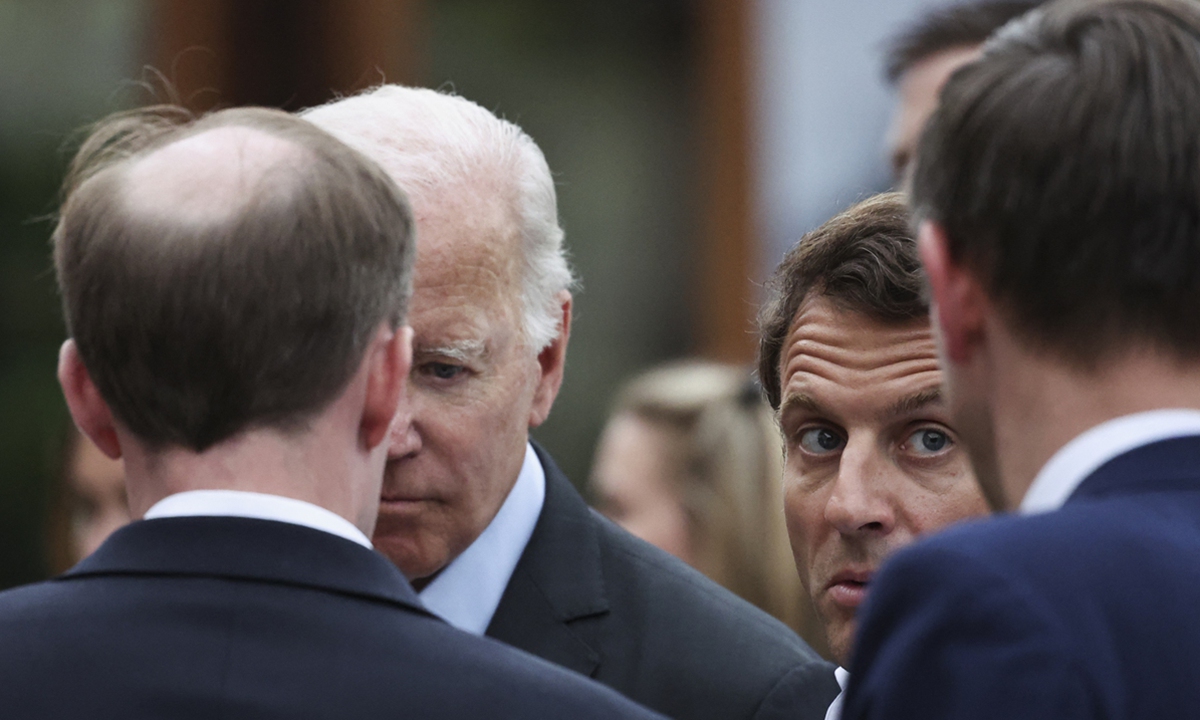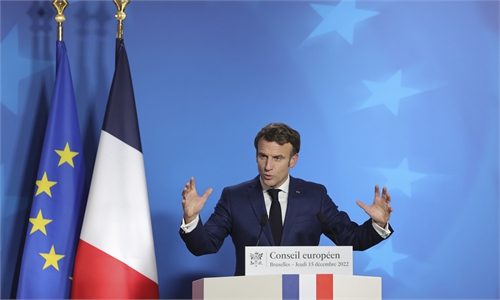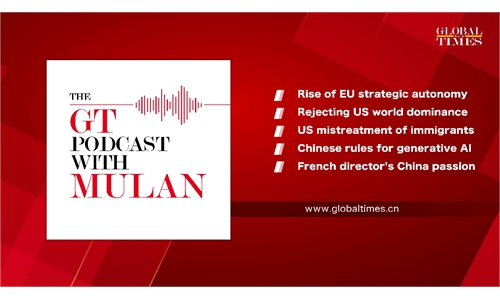
US President Joe Biden (left) and French President Emmanuel Macron attend the G7 Summit on June 27, 2022 at Elmau Castle, southern Germany.Photo: AFP
Remember when The Wall Street Journal mocked French President Emmanuel Macron's push for "strategic autonomy" following his China trip? "If President Biden is awake, he ought to call Mr. Macron…" the media wrote on April 9. Eleven days later, the call happened. Washington seems eager to prove that transatlantic partnership is still solid. But what it gets is an awkward scenario with two different readouts for the same conversation.
On Thursday local time, US President Joe Biden spoke with Macron by phone. The two different readouts from the White House and Élysée Palace have attracted a frenzy of interest. The White House articulated that the two sides "reaffirmed the importance of maintaining peace and stability across the Taiwan Strait." The French statement, however, did not mention the word "Taiwan."
Another significant contrast is the two sides' positions on the Ukraine crisis. The Élysée Palace's statement specifically mentioned, "China had a role to play in contributing, in the medium term, to an end to the conflict in accordance with the principles and purposes of the United Nations Charter," while the US' statement did not name China regarding the conflict.
In an effort to spin the transatlantic divergences a story of unity, the AFP commented that the talk "signaled efforts… to ease tensions in the wake of the French leader's recent remarks on Taiwan and the European security relationship with Washington." But the gap is too obvious to conceal. For observers, the episode shows no matter how hard the US and France try to display unity, their differences are right there, which will not melt, and may even swell.
The Russia-Ukraine conflict is traumatizing Europe, eroding its interests. A growing number of Europeans now wish to cut their loss.
When France realizes that US has no interest in easing or stopping the conflict, it does not want to block China from playing a role in this regard. The stance is based on French and European fundamental interests. But apparently, it goes against US' will to fully dominate the situation in Ukraine, and the US is resistant to see China play a contributive role, Wang Shuo, a professor at Beijing Foreign Studies University, told the Global Times.
At the same time, when the EU has its pressing troubles to face, Washington shows no qualms about diverting Brussels' attention to the Pacific front, and holding the bloc under its grip to confront China, through hyping up the Taiwan question. Nevertheless, as Macron put it, the EU does not want to be "caught up in crises that are not ours," adding "Europeans cannot resolve the crisis in Ukraine; how can we credibly say on Taiwan?"
It means when it comes to some specific issues regarding China policy, such as the Taiwan question, European countries, represented by France, are keeping a distance from the US, Cui Hongjian, director of the Department of European Studies at the China Institute of International Studies, told the Global Times.
The divergence on the two sides of Atlantic Ocean on the understanding over their alliance is also emerging.
Cui said that for Macron, France has fulfilled its duty as an ally via maintaining communication with the US both before and after his China visit. But this is not enough for the US. Should the two sides have their different and independent stances? Or must they share the exact same stance, perspective, and even the same way to deal with issues? Growing differences are bubbling. And Macron has shown, once again, from the recent call, that Europe must resist pressure to become a blind follower of the US.
The Russia-Ukraine conflict has caused several heavy shocks to Europe. It even changed the way Europe views the world. As a result, the EU has started to readjust its relations with the globe, including ties with the US and China, Wang said.
Against the backdrop, the US must be anxious. In the eyes of Washington, Europe has been a crucial card, a tool, which has well served the US in the Ukraine crisis. But now, this tool is having rising sense of strategic autonomy, which will become a US headache. Because in such a context, the US will have to spend more energy and resources to deal with Europe, rather than focusing on fire against China, experts noted.
Granted, the transatlantic relationship will see no major change any time soon. Their common principles and values will be maintained. But in terms of specific issues, their shared stance is becoming hollowed out, according to Cui.
After all, from the European debt crisis, to the tariff war, to the energy crisis, the US has long lost its willingness to help and support Europe like after the end of the WWII. Now, it has been displaying little goodwill when exploiting EU's interests. What's left in the transatlantic relationship is nothing more than a declining post-war order in which the US enjoys hegemony and EU share some dividends, combined with some empty slogans about ideology and values.
US' leadership and control over its allies are degrading, whether it uses carrots or sticks. Worse, Washington is running out of effective approaches to fix cracks on their ties. This is not only the predicament in transatlantic relations, as mirrored in the Biden-Macron call, but also an awkward moment for US diplomacy.
The author is a reporter with Global Times. opinion@globaltimes.com.cn


